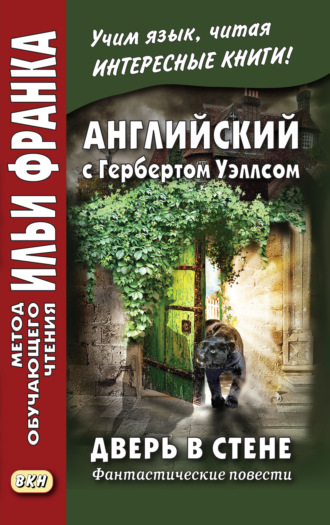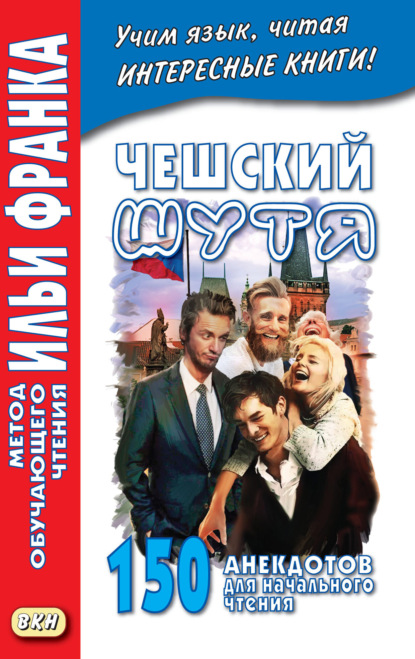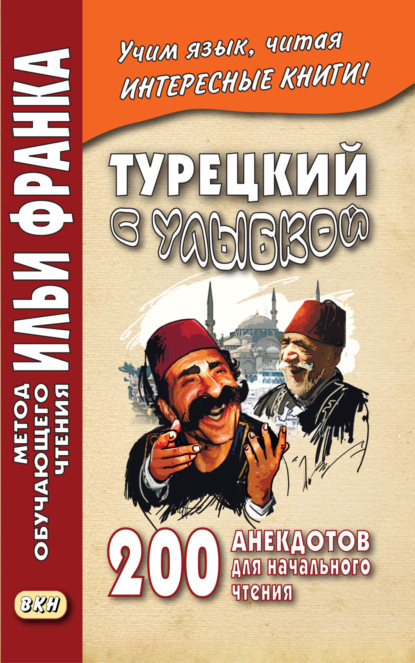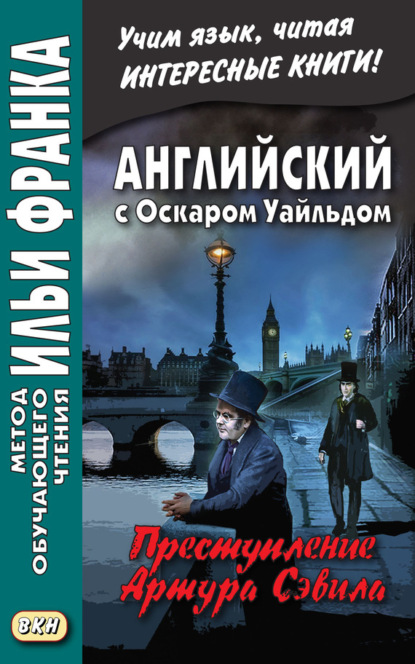
Полная версия
Английский с Гербертом Уэллсом. Дверь в стене. Фантастические повести / Н. G. Wells. The Door in the Wall
And it came into his life early (и это рано вошло в его жизнь), when he was a little fellow between five and six (когда он был маленьким ребенком пяти-шести лет). I remember how (я помню, как), as he sat making his confession to me with a slow gravity (когда он сел и начал свой рассказ: «сел делающим признание» с неспешной серьезностью), he reasoned and reckoned the date of it (он пытался определить, когда это началось: «думал и вычислял дату этого»). “There was,” he said, “a crimson Virginia creeper in it (там был какой-то малиновый дикий виноград/плющ; creeper – тот, кто ползает; ползучее растение) – all one bright uniform crimson in a clear amber sunshine against a white wall (исключительно один яркий однообразный малиновый цвет в ясном солнечном янтарном свете на фоне белой стены). That came into the impression somehow (это как-то отпечаталось в сознании: «пришло во впечатление»), though I don't clearly remember how (хотя я не помню точно как), and there were horse-chestnut leaves upon the clean pavement outside the green door (а на чистом тротуаре перед зеленой дверью были листья конского каштана). They were blotched yellow and green (они были пятнистые – желтые и зеленые), you know, not brown nor dirty (знаешь, ни коричневые, ни грязные), so that they must have been new-fallen (так что они, наверное, опали недавно). I take it that means October (я заключаю, что это означает октябрь = значит, был октябрь). I look out for horse-chestnut leaves every year (я слежу за листьями конского каштана каждый год), and I ought to know (и я знаю: «должен знать»).
early ['ɜ:lɪ], crimson ['krɪmzn], year [jɜ:]
To him at least the Door in the Wall was a real door leading through a real wall to immortal realities. Of that I am now quite assured.
And it came into his life early, when he was a little fellow between five and six. I remember how, as he sat making his confession to me with a slow gravity, he reasoned and reckoned the date of it. “There was,” he said, “a crimson Virginia creeper in it – all one bright uniform crimson in a clear amber sunshine against a white wall. That came into the impression somehow, though I don't clearly remember how, and there were horse-chestnut leaves upon the clean pavement outside the green door. They were blotched yellow and green, you know, not brown nor dirty, so that they must have been new-fallen. I take it that means October. I look out for horse-chestnut leaves every year, and I ought to know.
“If I'm right in that (если я прав в этом = если не ошибаюсь), I was about five years and four months old (мне было около пяти лет и четырех месяцев).”
He was, he said, rather a precocious little boy (он был, сказал он, довольно развитой не по годам мальчишка; precocious – скороспелый, ранний; рано развившийся; не по годам развитой) – he learned to talk at an abnormally early age (он научился разговаривать необыкновенно рано), and he was so sane and “old-fashioned (и он был такой благоразумный и «взрослый»; old-fashioned – старомодный; характеризуемый поведением как у взрослого),” as people say (как говорят люди), that he was permitted an amount of initiative that most children scarcely attain by seven or eight (что ему разрешали количество инициативы = столько самостоятельности, сколько большинство детей едва получают к семи-восьми годам; initiative – инициатива; способность к самостоятельным активным действиям). His mother died when he was born (его мать умерла при родах: «когда он был рожден»), and he was under the less vigilant and authoritative care of a nursery governess (и он был под менее бдительным и властным присмотром бонны; nursery governess – бонна; воспитательница, наставница). His father was a stern, preoccupied lawyer (его отец был строгим, /вечно/ занятым/погруженным в свои дела адвокатом), who gave him little attention (который уделял ему мало внимания), and expected great things of him (и ожидал от него великих дел). For all his brightness he found life a little grey and dull I think (я думаю, несмотря на свои способности, он считал жизнь немного серой и скучной; for all – несмотря на, хотя). And one day he wandered (и однажды он отправился побродить; to wander – бродить, странствовать, скитаться).
precocious [prɪ'kǝʋʃǝs], people ['pi:pl], initiative [ɪ'nɪʃǝtɪv], authoritative [ɔ:'θɒrɪtǝtɪv]
“If I'm right in that, I was about five years and four months old.”
He was, he said, rather a precocious little boy – he learned to talk at an abnormally early age, and he was so sane and “old-fashioned,” as people say, that he was permitted an amount of initiative that most children scarcely attain by seven or eight. His mother died when he was born, and he was under the less vigilant and authoritative care of a nursery governess. His father was a stern, preoccupied lawyer, who gave him little attention, and expected great things of him. For all his brightness he found life a little grey and dull I think. And one day he wandered.
He could not recall the particular neglect that enabled him to get away (он не мог вспомнить, как ему удалось: «какая халатность позволила» удрать), nor the course he took among the West Kensington roads (ни направление, которое он избрал среди дорог Западного Кенсингтона). All that had faded among the incurable blurs of memory (все это постепенно исчезло среди неизлечимых размытостей = провалов памяти). But the white wall and the green door stood out quite distinctly (но белая стена и зеленая дверь выделялись совершенно отчетливо).
As his memory of that remote childish experience ran (как следовало из его воспоминаний о том далеком = давнем событии в детстве; to run – бежать; гласить, быть выраженным), he did at the very first sight of that door experience a peculiar emotion, an attraction, a desire to get to the door and open it and walk in (он при первом же взгляде на ту дверь испытал необыкновенное чувство, влечение, желание подойти к двери, открыть ее и войти).
among [ǝ'mʌŋ], incurable [ɪn'kjʋǝrǝbl], peculiar [pɪ'kju:lɪǝ]
He could not recall the particular neglect that enabled him to get away, nor the course he took among the West Kensington roads. All that had faded among the incurable blurs of memory. But the white wall and the green door stood out quite distinctly.
As his memory of that remote childish experience ran, he did at the very first sight of that door experience a peculiar emotion, an attraction, a desire to get to the door and open it and walk in.
And at the same time he had the clearest conviction that either it was unwise or it was wrong of him (и в то же время он имел = ощущал очень четкую убежденность, что либо это неблагоразумно, либо неправильно) – he could not tell which (он не мог понять: «сказать» что /из двух/; to tell – отличать, различать; осознавать, понимать, постигать) – to yield to this attraction (если он поддастся: «поддаться» этому влечению). He insisted upon it (он настаивал на этом) as a curious thing that he knew from the very beginning (как на любопытном факте, который он знал с самого начала) – unless memory has played him the queerest trick (если память не сыграла с ним необычнейшую шутку) – that the door was unfastened (/настаивал/ что дверь была открыта), and that he could go in as he chose (и что он сможет войти, когда решится; to choose – предпочитать; решаться на какой-л. выбор).
I seem to see the figure of that little boy (я так и вижу фигуру того маленького мальчика; to seem – казаться), drawn and repelled (притягиваемого и отталкиваемого = которого и влечет к двери, и отталкивает от нее). And it was very clear in his mind, too (и было еще очень ясно = отчетливо осознавалось в его уме; clear – четкий, отчетливый осознаваемый, ясно видимый), though why it should be so was never explained (хотя никогда не прояснилось, почему = хотя так и не ясно, с чего бы это), that his father would be very angry if he went through that door (что его отец очень рассердится, если он войдет через эту дверь).
either ['aɪðǝ], unfastened ['ʌn'fɑ:snd], figure ['fɪɡǝ]
And at the same time he had the clearest conviction that either it was unwise or it was wrong of him – he could not tell which – to yield to this attraction. He insisted upon it as a curious thing that he knew from the very beginning – unless memory has played him the queerest trick – that the door was unfastened, and that he could go in as he chose.
I seem to see the figure of that little boy, drawn and repelled. And it was very clear in his mind, too, though why it should be so was never explained, that his father would be very angry if he went through that door.
Wallace described all these moments of hesitation to me with the utmost particularity (Уоллес описал мне все эти моменты колебания с крайней обстоятельностью/в мельчайших деталях). He went right past the door (он прошел прямо мимо двери), and then, with his hands in his pockets (а потом /засунув/ руки в карманы), and making an infantile attempt to whistle (и сделав ребяческую попытку засвистеть), strolled right along beyond the end of the wall (побрел прямо вперед, пока не кончилась стена: «за пределы конца стены»). There he recalls a number of mean, dirty shops, and particularly that of a plumber and decorator (там, как он вспоминает, /был/ ряд захудалых, грязных лавок и особенно мастерская водопроводчика и мастера по внутренней отделке помещений), with a dusty disorder of earthenware pipes (с пыльным беспорядком из глиняных труб), sheet lead, ball taps (листов свинца, кранов: «шариковых кранов»), pattern books of wall paper (/подшитых в/ книги образцов обоев), and tins of enamel (и банок с эмалью). He stood pretending to examine these things, and coveting, passionately desiring the green door (он стоял, делая вид, что рассматривает эти вещи, но /на самом деле/ жаждал, страстно желал /вернуться/ к зеленой двери).
whistle ['wɪsl], plumber ['plʌmǝ], passionate ['pæʃǝnɪt]
Wallace described all these moments of hesitation to me with the utmost particularity. He went right past the door, and then, with his hands in his pockets, and making an infantile attempt to whistle, strolled right along beyond the end of the wall. There he recalls a number of mean, dirty shops, and particularly that of a plumber and decorator, with a dusty disorder of earthenware pipes, sheet lead, ball taps, pattern books of wall paper, and tins of enamel. He stood pretending to examine these things, and coveting, passionately desiring the green door.
Then, he said, he had a gust of emotion (затем, он сказал, у него была = его охватила буря эмоций; gust – взрыв /гнева и т. п./). He made a run for it (он помчался к ней), lest hesitation should grip him again (пока колебания снова не охватили его), he went plump with outstretched hand through the green door and let it slam behind him
Конец ознакомительного фрагмента.
Текст предоставлен ООО «ЛитРес».
Прочитайте эту книгу целиком, купив полную легальную версию на ЛитРес.
Безопасно оплатить книгу можно банковской картой Visa, MasterCard, Maestro, со счета мобильного телефона, с платежного терминала, в салоне МТС или Связной, через PayPal, WebMoney, Яндекс.Деньги, QIWI Кошелек, бонусными картами или другим удобным Вам способом.












